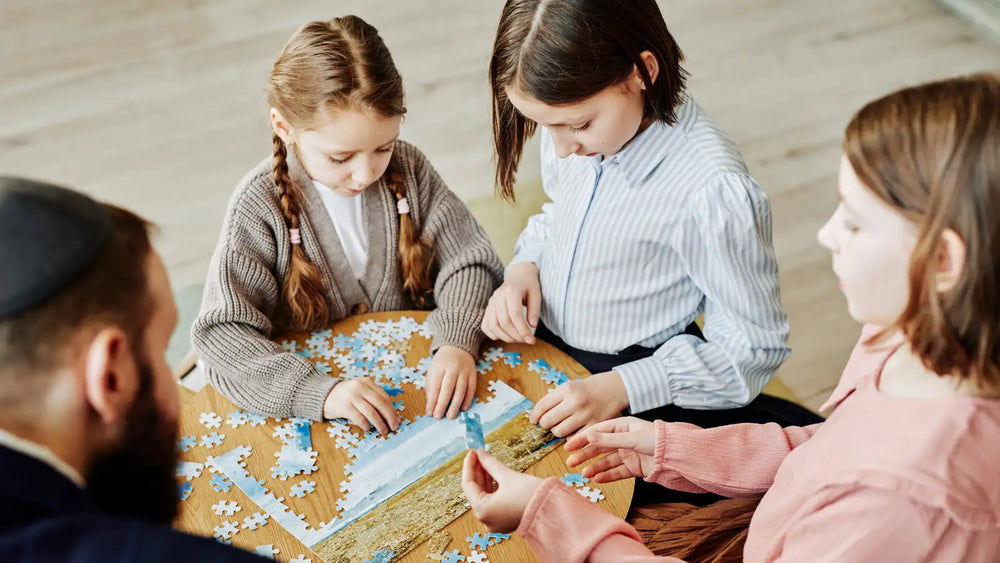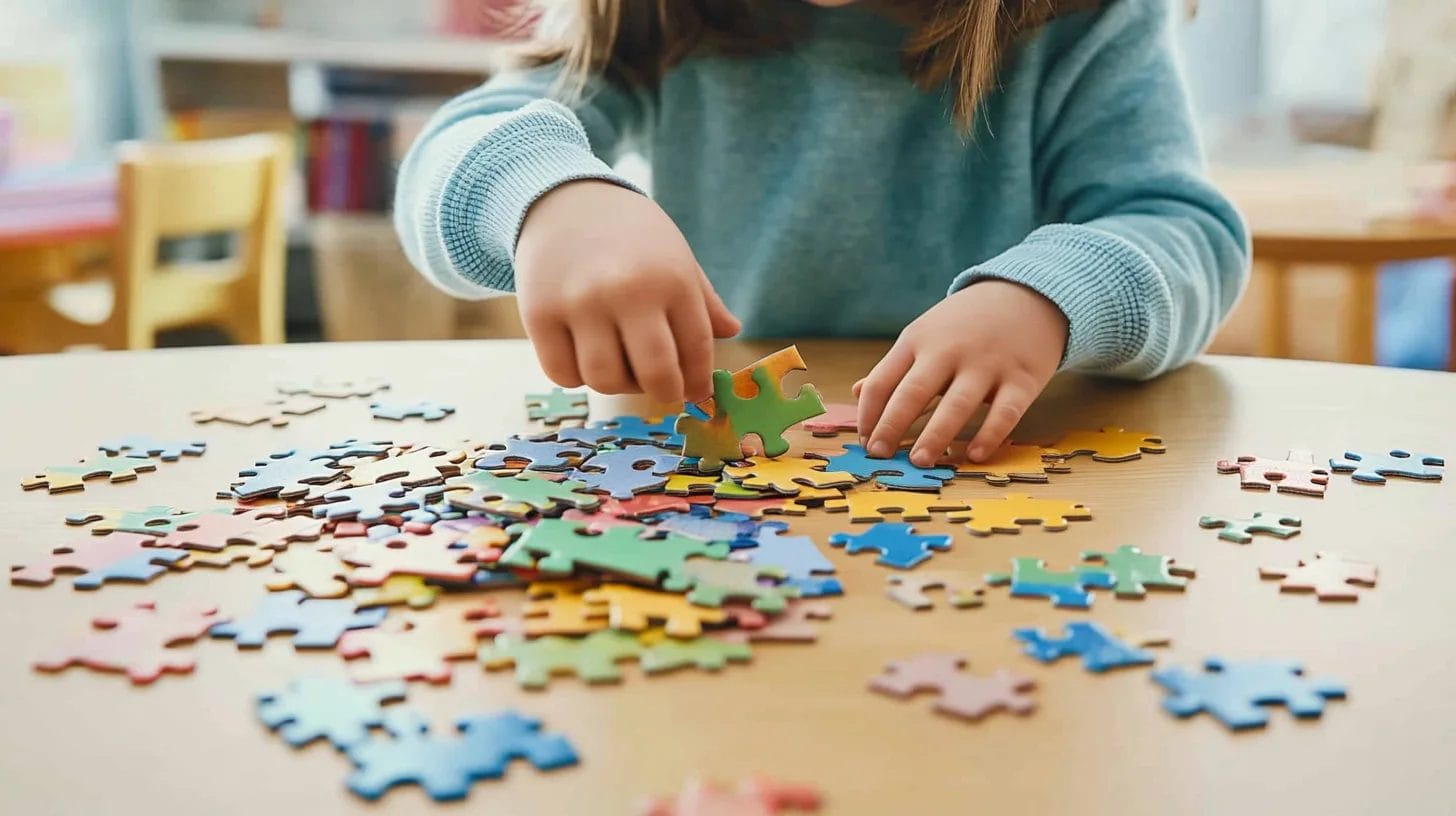
Jigsaw puzzles offer immediate benefits for your child's growth. They enhance various developmental areas, making them a powerful tool for learning.
This activity boosts short-term memory and slows cognitive decline. Research shows that children who play with jigsaw puzzles between ages two and four develop advanced spatial skills. These skills are crucial for success in STEM fields.
Discover why jigsaw puzzles are great for kids and how they can positively impact your child's development.
Why Jigsaw Puzzles Are Great for Kids? 14 Benefits

Jigsaw puzzles offer many benefits that can significantly enhance child development. Let's explore why puzzles are great for kids in these areas.
1. Problem-Solving Skills
When your child works on a jigsaw puzzle, they use critical thinking and plan their moves strategically.
Each piece presents a challenge. Your child must solve it by analyzing shapes, colors, and patterns. This activity encourages creative thinking and strategic analysis, essential components of problem-solving.
2. Memory Enhancement
Jigsaw puzzles also play a crucial role in enhancing memory. As your child works on a puzzle, they must recall the shapes, colors, and patterns of pieces they have previously examined.
This constant memory recall strengthens short-term memory and overall cognitive function. Studies have shown that puzzle pieces can even stave off memory loss and dementia.
3. Spatial Awareness
Solving puzzles requires understanding how different pieces fit together to form a complete picture.
This process enhances visual-spatial processing. This is crucial for success in fields like science, technology, engineering, and mathematics.
4. Fine Motor Skills
Engaging in puzzling can refine your child's fine motor skills.
Picking up, turning, and fitting pieces together need precise hand movements. This process strengthens the small muscles in their fingers and hands. These are essential for tasks like writing and drawing.
5. Patience and Persistence
Completing a jigsaw puzzle requires patience and persistence. Your child learns to tackle challenges without giving up, even when the task seems difficult. This perseverance is crucial for overcoming obstacles in various aspects of life.
As they work through the puzzle, they experience the satisfaction of achieving small goals. Thus, they'll build resilience.
6. Attention to Detail
Jigsaw puzzles demand careful observation and attention to detail. Your child must notice subtle differences in shapes, colors, and patterns. This focus enhances their ability to concentrate on tasks and improves observational skills.
7. Teamwork and Collaboration
When children work on puzzles together, they learn the importance of teamwork. Each child brings a unique perspective and skill set to the table. This can help solve the puzzle more efficiently.
By sharing ideas and strategies, children develop communication skills and learn to value the input of others. This collaborative effort not only makes the puzzle-solving process more enjoyable but also teaches children how to work effectively in a team.
8. Conflict Resolution
Working on puzzles with others can sometimes lead to disagreements. But these moments provide valuable opportunities for children to practice conflict resolution. They learn to express their opinions respectfully, listen to others, and find compromises.
This process helps children develop empathy and understanding. These are crucial skills for resolving conflicts in everyday life.
9. Building Friendships
Jigsaw puzzles can also be a wonderful way to build and strengthen friendships. As they work together to complete a puzzle, they share experiences, laughter, and triumphs.
This shared activity fosters a sense of camaraderie and trust. This can lead to lasting friendships.
10. Self-esteem and Confidence
Jigsaw puzzles can boost your child's self-esteem and confidence. As your child completes a puzzle, they experience a sense of accomplishment. This achievement reinforces their belief in their abilities.
Each piece they fit correctly builds their confidence. This encourages them to tackle more challenging tasks.
11. Stress Relief and Relaxation
Jigsaw puzzles offer a calming effect. This makes them an excellent tool for stress relief and relaxation.
When your child focuses on fitting pieces together, they enter a state of mindfulness. This concentration helps them forget about worries and reduces anxiety. The repetitive nature of puzzling can be soothing. It provides a mental break from daily stressors
12. Learning about Themes and Subjects
Jigsaw puzzles can introduce your child to various themes and subjects. Puzzles cover diverse topics, from animals to famous landmarks.
As your child pieces together a puzzle, they learn about the subject matter in the image. This process encourages curiosity and exploration, making learning enjoyable and engaging.
13. Language and Vocabulary
Jigsaw puzzles can also enhance your child's language and vocabulary skills. As they work on a puzzle, they may encounter new words related to the theme.
Discussing the puzzle with friends can expand their vocabulary and improve communication skills.
14. Math Skills
Jigsaw puzzles can help your child develop essential math skills. As they sort and organize pieces, they practice counting, pattern recognition, and spatial reasoning. These skills are fundamental for success in mathematics and other STEM fields.
How to Choose the Right Jigsaw Puzzle for Children
Selecting the perfect puzzle involves considering the child's age and developmental stage. Here's how you can make an informed choice:
- Age Appropriateness: Choose puzzles that match your child's age. Younger children benefit from larger pieces and simpler designs. These puzzles help them develop hand-eye coordination.
- Complexity Level: Consider the complexity of the puzzle. For toddlers, select puzzles with fewer pieces and vibrant images. Gradually introduce puzzles with more pieces and intricate designs as your child grows.
- Interests and Themes: Pick puzzles that align with your child's interests. Whether they love which theme, themed puzzles can spark curiosity and make learning enjoyable.
- Material and Safety: Ensure the puzzle is made from safe, durable materials. Always check for non-toxic finishes and smooth edges to prevent injuries.
- Educational Value: Opt for puzzles that offer educational benefits. Puzzles featuring numbers, letters, or maps can playfully introduce basic concepts.
- Social Interaction: Consider puzzles that encourage social play. Larger puzzles or those designed for group activities promote teamwork and communication skills.
Conclusion
Jigsaw puzzles offer many benefits for your child's development. They enhance cognitive skills while fostering patience and persistence.
Encourage your child to explore puzzles that match their interests and developmental stage. This engagement not only boosts learning but also builds confidence and resilience.
Embrace the long-term positive impact of puzzles on your child's growth and learning journey.